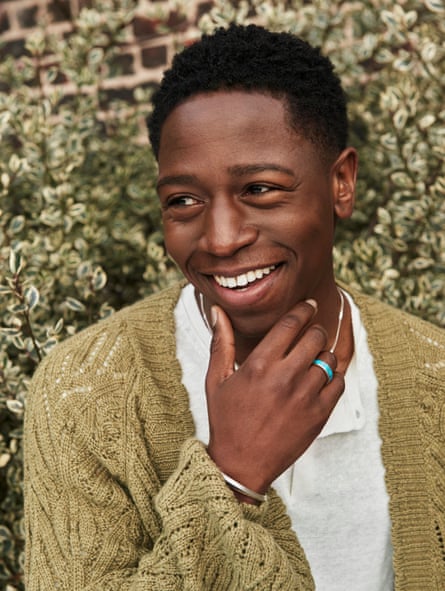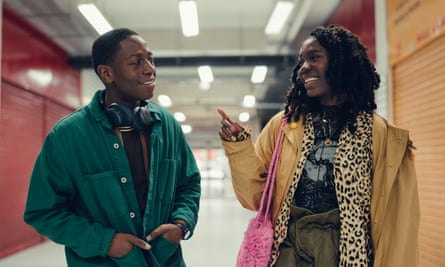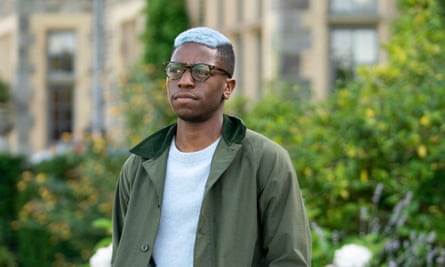The trip David Jonsson took to Los Angeles last month was his first to Tinseltown. And though it was only fleeting, the British actor was busy. “It was a lot,” Jonsson says with a broad smile at a London restaurant a few days after returning. “Everyone was plying me with presents: there were sports tickets, gift baskets, drinks, dinners.” A sheepish giggle. “It was all quite unexpected, to say the least.”
Except, of course, it was perfectly predictable. Jonsson had arrived in LA fresh from the Sundance Film Festival, where Rye Lane, a new Disney romcom in which he stars, was one of the festival’s big successes. He’d already garnered attention with a chunky role in two seasons of HBO’s Industry. (There is a third season to come.) In LA, he was hot property.
“I’m not saying it wasn’t fun,” he wants to be clear, “a nice experience. But honestly? There’s something about LA that didn’t sit right.” In meeting after meeting, Jonsson struggled to be excited by the glitz, and he remained unimpressed by the brightly lit career paths various agents pitched. You’d think a young actor breaking through would revel in all of this recognition. But for all the flattery and fine-dining, Jonsson couldn’t wait to get back to London. “It wasn’t my cup of tea at all,” he says. Far more enticing is the prospect of playing parts in UK productions – he has a deep desire to make it on home turf. “Maybe I’m too young to be 100% confident,” says the 28-year-old, “but I can see what’s possible here now that hasn’t always been.”
It’s no secret that for too long many Black British actors have felt heading stateside was their only option to land a wide variety of roles. “It shouldn’t be about exclusivity,” he says, “here or there. But in the past it has had to be. You had to go over there to make it work. And they were right, of course. Black actors couldn’t do it here. But my generation stands on the shoulders of giants. People have spoken up. Strived. Forced a space here wide open to make sure that, just maybe, I won’t need to leave to make it. That I can find that fulfilment at home.”
Early signs certainly suggest he’s making tracks. In Industry, Jonsson plays Gus, an “incredibly entitled, born-to-rule” Old Etonian, gay, Oxford grad fighting for a permanent job at a fictional London investment bank, having landed himself a place on a competitive graduate scheme. It makes for anxiety-inducing viewing: sex, drugs, treachery, tragedy. Rye Lane is set a few miles down the road, in Peckham, but in story and style it’s worlds apart. We first meet Dom – Rye Lane’s leading man – blubbering over his ex-girlfriend in an art gallery loo. “Being able to go from Gus straight into playing a guy from Peckham who likes football, who cares about his girlfriend but gets it wrong… Someone vulnerable? It’s so far from Industry, which is what I was desperate to do.” Soon, he’ll play Chris Eubank in a silver screen biopic. “Again, hardly your archetypal British black man, is he? Eubank is his own lane. I want to keep changing it up.”
Young Black men, Jonsson believes, are often presented on screen as having a singular experience in Britain. “I’m very much an optimist,” Jonsson says, “but straight up we’re only really seen one way in the media. That we have an armour on us. Chin up, shoulders back, be strong. Our white counterparts have all these different presentations: from Harry Styles to Tom Hardy. But we don’t really have so many variations. Yes, the world does that to us. But the culture we create collectively can also perpetuate it.”

He goes on: “The last thing I’m trying to do is disparage or diminish what we do so well.” He is referring to powerful, purposeful, hard-hitting Black British dramas, “stories written from a point of truth, which are important and need telling. But they’re often the only ones that we watch, engage and associate with. I really believe there’s space for other stories to be told here, stories already being lived out, but left unseen.” Stories like his own. Jonsson says all this with a smile – he is charmingly self-effacing. But there’s no doubting his determination to achieve professionally something also profoundly personal.
A true east London lad, Jonsson was raised in Newham, the youngest of four siblings. His dad worked as an IT engineer at Heathrow. His mum was a Metropolitan police officer in Islington. “I actually grew up in Custom House,” he clarifies, “right in the Docklands. Back then it was really underdeveloped. We were out on the fringes.” It was both inner-city and detached from the rest of the capital. Home was full of music, art and culture. “I loved poetry,” he says, “we had James Baldwin, John Keats, Langston Hughes and Shakespeare. On Saturdays, Dad and I would wake up early and go to one of the cinemas in Leicester Square, just the two of us. We’d watch a movie, then get a KFC.” He’s beaming. “Man, they were the best.”
But despite being a quiet, artsy kid, by 14 Jonsson found himself in trouble. Fights were breaking out at school. Too often, Jonsson was central to the scraps. “Now,” Jonsson says, “a decade later, I can see I was just going through my feelings. But I didn’t know how to deal with them, so I just started fighting, and got expelled.” He was sent to a local Pupil Referral Unit, where he would spend at least a month before potentially returning to mainstream education. “Being there shook me up,” he says. “At first it felt pretty small. You have to remember, at this point in time, a lot of my mates were in actual trouble, not schoolboy stuff: stabbings, gangs, real crime. Unplanned pregnancies. But being there, it dawned on me how serious this might be. It was a real wake-up call.”

Mum, meanwhile, was diplomatic. “We have this narrative in this country about Black parents,” he suggests, “that they’re strict and unbending. That’s not my parents at all. When all that kicked off, she asked what I wanted to do. From nowhere, really, I said acting. Until then I was the kid at school who would laugh at the drama lot. I was too shy and self-conscious. But there was something in language and performance that spoke to me. Her response was just get on with it. Don’t talk about it, do it.”
Hoping for a fresh start, Jonsson found a new school where he allowed himself a reinvention. “I left my old school mates behind, and some of my attitudes, too,” he says. “Inadvertently, I’d been holding back to fit in. To impress this girl; playing to the boys. Upholding expectations.” In Hammersmith, on the other side of the city, Jonsson had space to try something new. His acting chops were immediately apparent. After turns in school productions of Richard II and Cabaret, he found the work of British playwright Sarah Kane. “We did a lot of her shows at school for some reason,” he recalls, “which is quite intense, with her constant barrages of wrist-cutting.” Still, a teenage Jonsson was hooked on her confrontational explorations of desire, death and pain. That Christmas, his parents got him Kane’s full back catalogue. “I was like ‘yes’,” he says, still squealing in excitement. “I went through everything. Blasted, Cleansed. Skin. Drama could be real. Be felt. I fell in love with it all.”
By 15, Jonsson had almost lived two adolescences. “It’s why I’m so keen now, I think, on doing different things in my work. In showing alternative characters; a variety of young black British experiences. Because I needed to know there were these different options early on, but they were nowhere to be seen.” The following year, Jonsson was offered a full scholarship to study art and drama at New York’s American Academy of Dramatic Arts. It marked the start of a third teenage chapter. He’d never been to the United States before, let alone on a solo trip. “It was crazy,” he says of the time, “I felt a real responsibility to make the most of it given my parents let me go. I saw so much cinema, so much theatre. But it was fucking New York, man. Most of my friends were older, so I was snuck into bars and clubs…” He checks himself, aware Mum and Dad might be reading. “When I came back I was totally focused. Let’s just say I got a lot out of my system in that time.”

Returning to England at 18, he worked in retail and joined the National Youth Theatre, where he was cast in an adaptation of Stephen Kelman’s Booker-prize-winning novel Pigeon English. “I played the lead,” he says. “Harrison Opoku – an 11-year-old Ghanaian boy living on a rough estate in London.” Based loosely on the killing of Damilola Taylor, it was a heartbreaking part to play. “He was this bright-eyed boy; everything was amazing to him,” says Jonsson, “then he came to Peckham, where everyone was cynical by 12. He didn’t get it. He didn’t understand. He was a totally different kind of young Black man to those we so often see depicted.” It was devastating, but Jonsson embraced the opportunity to tell this complex story on stage.
He was accepted at Rada on his first attempt, securing another scholarship. He left the course a little early when he bagged a part in Mary Stewart, directed by Robert Ike at the Almeida. “I was sharing a stage with Lia Williams and Juliet Stevenson,” he says, still not quite believing it. “These fucking powerhouses who taught me so much.” There was a coin toss every night to see who would play the lead. “There were two totally different shows: I snogged Lia Williams if she was queen; if it was Juliet Stevenson, she’d beat the shit out of me. Either way I was thrilled.” Soon he was in the West End, opposite David Tennant in Patrick Marber’s Don Juan in Soho. Then came his first TV role, in a Fox espionage thriller series, Deep State. “We were shooting guns in the desert and driving Defenders,” Jonsson says, “it was wicked. And then Industry came through shortly after.” Since then, the work has come thick and fast.
Still, Jonsson is trying to be selective. “I don’t think I’m a regular actor,” he says, “nine out of 10 scripts that I look at I say I’m wrong for; count myself out.” His agent hasn’t always appreciated this approach. “But it’s important to me to focus on finding ways to show parts of our culture that aren’t really spoken about. People who aren’t the mainstream. Right now, all I have is the power to say yes or no.” It’s time for his photoshoot round the corner. “Anyway,” he adds, all smiles again, “I’m really not a freedom fighter. I’m just an actor. I’m still getting used to all this, to be honest. And what do I know?” It’s the only thing he says all afternoon that leaves me entirely unconvinced.
Rye Lane is in UK cinemas from 17 March
Stylist David Nolan; grooming Keshia East at Carol Hayes Management using Skincare Medik 8 and Estée Lauder; photographer’s assistant Jomile Kazlauskaite
"freedom" - Google News
March 05, 2023 at 04:00PM
https://ift.tt/hyoDTp0
‘I’m not really a freedom fighter’: actor David Jonsson on Tinseltown and making it on home turf - The Guardian
"freedom" - Google News
https://ift.tt/i3qHN4h
https://ift.tt/Yp3MVPl
Bagikan Berita Ini














0 Response to "‘I’m not really a freedom fighter’: actor David Jonsson on Tinseltown and making it on home turf - The Guardian"
Post a Comment